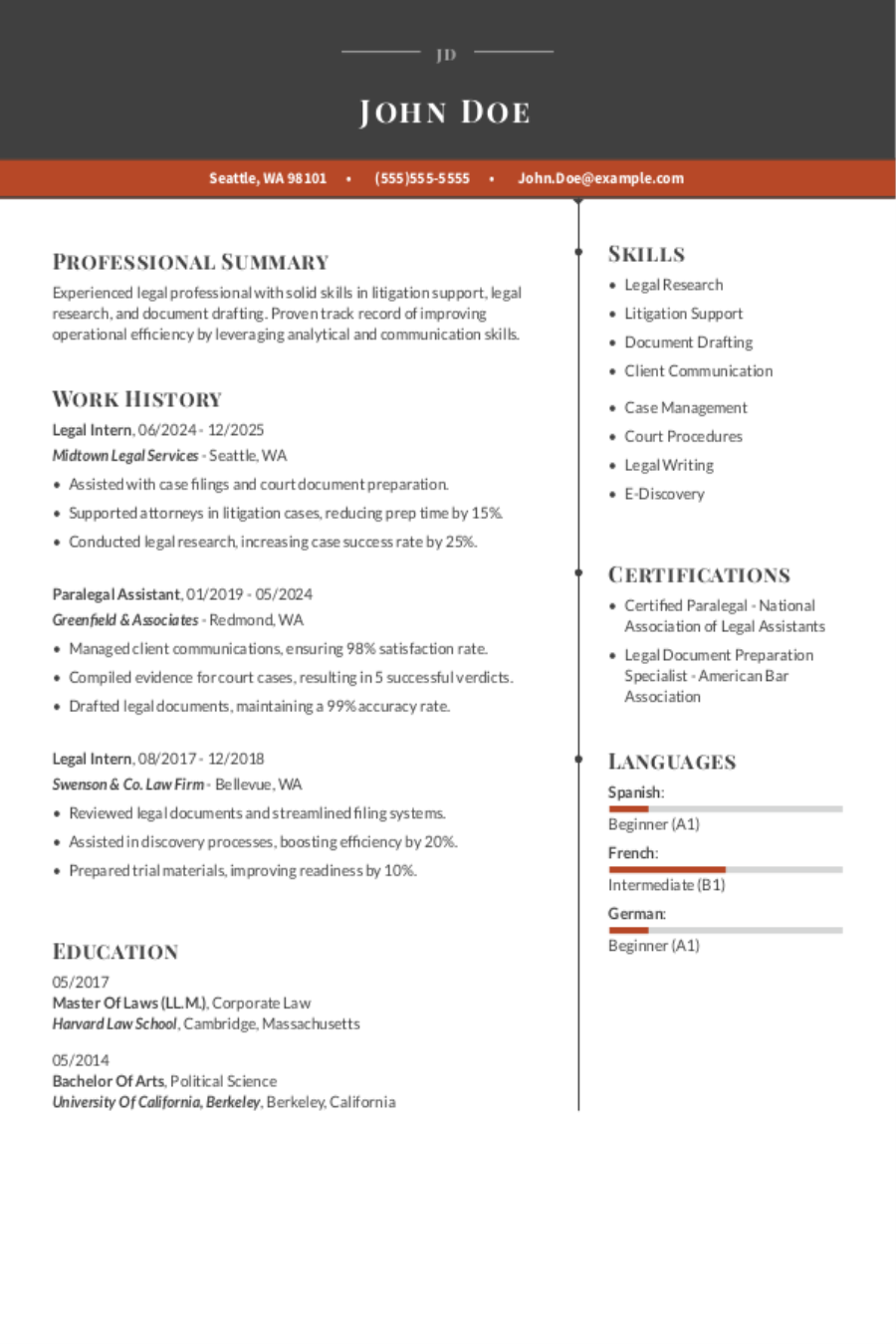Table of contents
Popular Hospital Administrator Resume Examples
Entry-level hospital administrator resume
An entry-level resume for a hospital administrator should focus on relevant educational background, internships, certifications, and essential skills like leadership, communication, and problem-solving to demonstrate readiness for the role.
Focus on goals: This resume demonstrates a proactive approach to their early career in hospital administration by showcases specific accomplishments, including improving patient satisfaction through innovative service improvements.
Solid education: This applicant highlights advanced education relevant to hospital administration, showcasing a master's degree as well as a bachelor's degree in the required fields. These diplomas are evidence of a solid foundation in healthcare management, organizational leadership, and operational excellence expertise.
Mid-career hospital administrator resume
A mid-career hospital administrator resume should effectively showcase a combination of leadership experience, operational skills, and continuous professional development to attract the attention of potential employers in the healthcare sector.
Mentions hard and soft skills: This resume effectively highlights the applicant’s mix of technical expertise in healthcare management and interpersonal skills, demonstrating their well-rounded capabilities as a hospital administrator.
Balances skills with experience: Effectively shows this job seeker's technical expertise in healthcare management alongside their career progression from administrative coordinator to hospital administrator.
Experienced hospital administrator resume
An experienced hospital administrator resume should prioritize highlighting leadership achievements, operational improvements, and effective management of healthcare teams to clearly illustrate the applicant's career growth and impact in the medical field.
Concise professional summary: The opening summary focuses on the applicant's 13 years of healthcare leadership experience, emphasizing their success in improving patient satisfaction and operational efficiency.
Numerical data: Quantifiable achievements provide impact to a job seeker's accomplishments, making it easier for recruiters to assess their contributions. For instance, highlighting that patient satisfaction increased by 25% or operational costs were reduced by $50K annually offers concrete evidence of effectiveness.
No experience hospital administrator resume
A resume for an applicant with no experience aiming to become a hospital administrator should emphasize relevant skills, educational achievements, and any volunteer work or internships that demonstrate their ability to manage healthcare operations effectively.
Simple style: This resume’s clean and straightforward layout gives a platform to the job seeker's relevant experience and educational background, focusing on qualifications for a the role without unnecessary embellishments.
Emphasis on professional skills: Emphasizing strong organizational and management skills showcases the job seeker's capability to excel as a hospital administrator, despite limited direct experience in the healthcare sector.
More resume examples
Hospital Administrator Resume Template
Kickstart your career with this comprehensive hospital administrator resume template. Feel free to make it your own by adding your personal details and unique experiences for a standout application.
Michael Rodriguez
Chicago, IL 60615
(555)555-5555
Michael.Rodriguez@example.com
Professional Summary
Dynamic hospital admin with 9 years' expertise. Driven leader in ops, enhanced patient care, and regulatory adherence.
Work History
Hospital Administrator
Greenfield Hospital - Chicago, IL
January 2022 - August 2025
- Improved patient satisfaction by 20%.
- Reduced operational costs by 15%.
- Implemented new staff training programs.
Healthcare Operations Manager
Riverside Medical Group - Chicago, IL
January 2018 - December 2021
- Boosted revenue growth by 30%.
- Streamlined department workflows.
- Enhanced compliance with regulations.
Administrative Supervisor
Meadowbrook Clinic - Chicago, IL
January 2016 - December 2017
- Managed a team of 25 administrative staff.
- Improved patient processing time by 10%.
- Reduced supply costs by 10%.
Skills
- Healthcare Management
- Operational Efficiency
- Budget Management
- Regulatory Compliance
- Team Leadership
- Patient Relations
- Data Analysis
- Strategic Planning
Education
MHA Healthcare Administration
Master of Healthcare Administration University Boston, MA
May 2016
Bachelor of Science Business Administration
University of Metropolis Metropolis, NY
May 2014
Certifications
- Certified Healthcare Administrator - American College of Healthcare Executives
- Project Management Professional - Project Management Institute
Languages
- Spanish - Beginner (A1)
- French - Intermediate (B1)
- German - Beginner (A1)
Must-Have Skills on a Hospital Administrator Resume
A strong skills section is vital for showcasing your qualifications on a resume.
The following data highlights the most prevalent hard and soft skills relevant to hospital administrators, sourced from Resume Now’s extensive resume database.
When you’re ready to improve your resume with key skills, try our AI Resume Skills Generator. It offers tailored suggestions based on your job title, enabling you to create a comprehensive and customized skill set.
Writing Your Hospital Administrator Resume
Having explored these exemplary resumes, you are now prepared to dive into the process of crafting your own. We will walk you through how to write a resume step by step, giving you tips along the way.
List your most relevant skills
An effective skills section should highlight both your technical expertise, like budgeting and compliance knowledge, and essential soft skills such as leadership and communication. Remember, this section is your chance to connect directly with the keywords from the job listing.
To maximize impact, carefully analyze the job listing for relevant keywords. Incorporating these terms not only helps demonstrate that you fit the role but also improves your chances of passing through applicant tracking systems (ATS). By aligning your skills with those specified in the listing, you cater to both recruiters and technology, increasing your visibility in a competitive job market.
Example of skills on a hospital administrator resume
- Proficient in managing hospital operations to improve patient care and safety
- Adept at budgeting and financial management to ensure efficient resource allocation
- Strong communicator with the ability to foster teamwork among diverse staff
- Analytical thinker who leverages data to drive strategic decisions
Don't forget to highlight your soft skills. Interpersonal abilities, including communication and teamwork, are immensely valued by employers because they are often challenging to develop through training. Showcasing these strengths can set you apart in a competitive job market.
Highlight your work history
The work experience section of your hospital administrator resume is important for showing your capabilities and accomplishments in the healthcare sector. This section should not only list your job responsibilities but also highlight specific achievements that demonstrate how you’ve effectively managed operations, improved patient care, or improved administrative processes. Using relevant keywords to highlight these successes will help capture the attention of hiring managers.
When detailing each job entry, include essential information such as your title, the name of the hospital or organization, and the dates of your employment. This information provides context to your career trajectory and establishes credibility in the field. Additionally, focus on quantifiable outcomes where possible—such as improvements in efficiency or patient satisfaction ratings—to further emphasize your impact.
Example of a hospital administrator work experience entry
- Hospital Administrator
City General Hospital - Dallas, TX
January 2019 - Present - Oversee daily operations of a 300-bed facility, ensuring compliance with healthcare regulations and best practices while improving patient care quality.
- Implement strategic initiatives that improved patient satisfaction scores by 20% within one year through improved service delivery and staff training programs.
- Manage a budget exceeding $10 million, allocating resources effectively to reduce operational costs by 15% without compromising service quality.
- Lead a team of 50+ healthcare professionals, fostering a collaborative environment that promoted professional development and reduced staff turnover by 30%.
- Coordinate with department heads to streamline processes, resulting in a 25% decrease in patient wait times and increased efficiency in service delivery.
Quantifying achievements as a hospital administrator is important for demonstrating your impact on operational efficiency and patient care. For example, stating that you reduced patient wait times by 40% through streamlined processes provides a measurable testament to your effectiveness in managing healthcare operations.
Include your education
The education section of your hospital administrator resume should be organized in reverse-chronological order, starting with your most recent degree. Include relevant degrees and diplomas while omitting your high school diploma if you have a bachelor’s degree or higher. To make a stronger impression, consider mentioning any honors or distinctions associated with your academic achievements.
If you are still in the process of completing your education or pursuing further studies, indicate the highest level achieved along with an expected graduation date. Adding bullet points that highlight relevant coursework or significant projects can also be beneficial, especially for those who are recent graduates or current students. This information helps demonstrate your knowledge base and skills related to healthcare administration.
Common certifications for a hospital administrator resume
- Fellow of the American College of Healthcare Executives (FACHE) – American College of Healthcare Executives
- Certified Healthcare Financial Professional (CHFP) – Healthcare Financial Management Association (HFMA)
- Certified Medical Manager (CMM) – Professional Association of Health Care Office Managers (PAHCOM)
- Board Certified in Healthcare Management (BCHM) – American College of Healthcare Executives
Sum up your resume with an introduction
Creating a compelling profile section provides your first opportunity to connect with potential employers. An effective profile acts as a hook, encouraging recruiters to explore the rest of your resume in detail.
You have two main options when structuring this section: a professional summary or a resume objective. If you have substantial experience, a professional summary allows you to spotlight your most impressive achievements and track record of success. For those newer to the workforce or changing careers, a resume objective provides space to articulate your passion for the field, relevant coursework, and clear career direction.
Professional summary example
Dynamic hospital administrator with over 10 years of experience in improving healthcare operations within diverse medical facilities. Demonstrated success in optimizing patient care processes, reducing wait times, and improving overall hospital efficiency. Expert in regulatory compliance, staff management, and strategic planning to foster a collaborative environment that prioritizes patient satisfaction and safety.
Resume objective example
Enthusiastic hospital administrator eager to use strong communication, organizational, and problem-solving skills to improve patient care and operational efficiency. Committed to fostering a collaborative environment that supports staff development while striving to implement innovative solutions for improved healthcare delivery.
Your resume profile should be concise yet packed with key information. Aim to limit your profile to three or four sentences that highlight your most significant accomplishments and skills. You can effectively convey any additional details or context in your cover letter, allowing you to maintain clarity and focus in your resume.
Add unique sections to set you apart
Including optional resume sections can improve your application by showcasing your unique qualifications. These sections provide a platform to highlight your diverse experiences beyond traditional job roles.
Incorporating relevant hobbies and volunteer work not only demonstrates your skills but also reflects your personal values, which are important in the healthcare field. For instance, if you volunteer at community health initiatives or engage in wellness programs, it shows your commitment to improving patient care and community well-being. This holistic view of your professional life can set you apart from other applicants and offer employers insight into how you may contribute to their organization’s mission.
Three sections perfect for a hospital administrator resume
- Languages: Effective communication is important for coordinating with diverse teams and stakeholders. Highlighting your language skills on your resume can improve collaboration and improve patient interactions, making you a more valuable applicant.
- Volunteer Work: Integrating volunteer work on a resume not only demonstrates your dedication to community service but also highlights the valuable skills acquired through these experiences, making you a more appealing job seeker in the healthcare sector.
- Quantifiable Metrics: As a hospital administrator, quantifiable accomplishments are important for demonstrating your impact on patient care and operational efficiency. For instance, you could mention reducing patient wait times by 30% or increasing staff retention rates by 15%.
5 Resume Formatting Tips
- Choose a format that matches your career stage.
When deciding on a resume format, consider your career level and experience. If you have extensive experience, a chronological resume highlights your career progression effectively. For those just starting out or changing fields, a functional resume focuses on skills and accomplishments. A combination format can also be beneficial by showcasing both your work history and relevant skills to create a well-rounded presentation of your qualifications.
- Pick a smart resume template.
Using a professional resume template is important for ensuring your information is easily readable and well-organized. A good template not only improves the visual appeal of your resume but also helps you maintain a consistent format throughout. When creating your own layout, opt for clear, simple fonts that are compatible with ATS systems to maximize readability.
- Use an appropriate font.
Choose a clean, professional font to improve your resume's readability. Fonts like Arial, Calibri, or Helvetica are great options that ensure clarity for both applicant tracking systems (ATS) and hiring managers.
- Use consistent formatting.
Ensure your resume is neatly aligned with uniform margins to improve readability and create a polished, professional image that stands out to hiring managers.
- Keep your resume to one or two pages.
Remember that resumes should be one page long to effectively showcase your qualifications. If you have extensive experience, a two-page format can work, but always prioritize clarity and conciseness to highlight the most relevant details.
Tools for Your Job Search
Are you preparing to apply for a position as a hospital administrator? Before you submit your application, consider using our ATS Resume Checker. This essential tool provides insights on how well your resume meets the criteria of automated systems used by many healthcare organizations during their initial applicant screening.
Looking for ways to elevate your resume? Our AI Resume Builder offers tailored recommendations specifically designed for your background in hospital administration, along with professional templates that effectively showcase your leadership skills and accomplishments in healthcare management.
Frequently Asked Questions
Last Updated: August 22, 2025
Absolutely. A cover letter adds depth to your resume and provides another platform for communication with employers. It allows you to express your enthusiasm for the role and clarify how your skills and experiences make you a perfect fit. Don’t underestimate its power; write a cover letter that showcases your unique qualifications.
For a streamlined approach, consider using our AI Cover Letter Generator, designed to help you create a customized, strong cover letter in minutes. You can choose from various cover letter template options that align perfectly with your resume, ensuring consistency in your application materials.
A resume is generally a concise document, typically one to two pages long, while a curriculum vitae (CV) can extend several pages and includes detailed information about your academic background, research accomplishments, publications, and professional experiences. This makes a CV more suitable for contexts where comprehensive detail is essential.
You should use a CV when applying for positions in academia, science, law, or specialized professions. If you’re preparing to create a CV, our online CV Maker is an excellent resource that allows you to craft tailored documents quickly. Choose from various CV templates designed for different industries and career levels to make your application stand out effectively.
When addressing gaps on your resume, it's important to be honest about the reasons behind them. Whether you took time for personal development or faced challenges, share how you remained productive during that period. Highlight any relevant skills or experiences gained and then shift the focus back to your qualifications and accomplishments. This approach not only shows integrity but also demonstrates your commitment to growth in your career as a hospital administrator.
To customize your resume, focus on tailoring it to spotlight essential skills that match the job you want. Analyze the job listing for key phrases and terminology, then weave these into your resume. This approach not only showcases your qualifications but also demonstrates your alignment with the specific role, making your application stand out.
Hospital administrators often begin their careers in entry-level roles such as administrative assistants or coordinators. Through advanced degrees and certifications, they can progress to senior management positions, overseeing entire healthcare facilities and operations.
As a hospital administrator, showcasing your commitment to continuous development is essential. You can do this by obtaining relevant certifications and listing completed courses. Attend seminars and share the key takeaways in your professional network. Reading industry-related books and listening to insightful podcasts will keep you informed. Additionally, actively participate in professional associations to demonstrate your dedication to staying abreast of healthcare trends.
Was this information helpful? Let us know!
Hailey is a career advice writer dedicated to helping job seekers excel in their careers.
More resources

How to Write a Resume for an Internal Position (Guide + Examples)
Ready for a new role within the same company? We ll help you...

The Great Workplace Reckoning: How 2025 Burned Out Workers & What’s Next for 2026
The workforce spent much of 2025 in survival mode navigating ...

What Is a CV? Curriculum Vitae Definition & Who Should Have One
Do you need to know what a CV stands for? We share the definit...

Legal Intern Resume: Examples & Templates
As a legal intern your resume should highlight essential skil...

Psychology Resume: Examples & Templates
As a psychology professional you need a resume that highlight...


